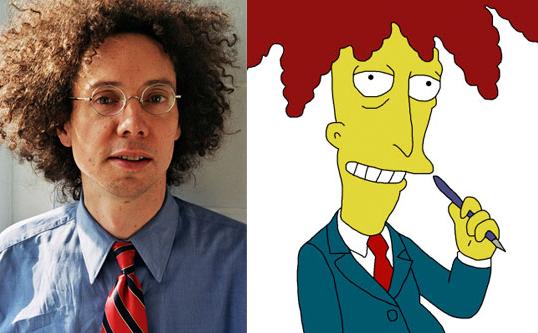What do you think is the most bat-shit crazy common human characteristic?
Malcolm Gladwell:
There are so many to choose from! How’s this. I do not understand the impulse that many people have of looking first for what they DISAGREE with in another person or idea, instead of looking first for what they might learn from. My second is that I don’t understand why we are so scared of changing our minds. What’s wrong with contradicting yourself? Why is it a bad thing to amend your previous opinions, when new facts are available? If a politician hasn’t flip-flopped at some point in his career, doesn’t that mean he’s brain dead?
____________________________
Question:
You write about Steve Jobs a lot and overall I would sum up your opinion of Jobs as rather quite negative. Is this wholly true and what sort of response have you received from people over this?
Malcolm Gladwell:
I have complicated thoughts about Steve Jobs. He fits very clearly into the idea I write about in David and Goliath about how entrepreneurs need to be “disagreeable”–that is, that in order to make something new and innovative in the world you need to be the kind of person who doesn’t care about what your peers think. Why? Because most of the greatest ideas are usually denounced by most of us as crazy in the beginning. Steve Jobs was a classic disagreeable entrepreneur. That makes him a difficult human being to be around. But were he not difficult, he would never have accomplished an iota of what he did!
____________________________
Question:
Your books have a really interesting critical thinking aspect to them. Do you have any idea what your next book/piece will be about?
Malcolm Gladwell:
I’m writing a bunch of pieces for the New Yorker right now. One is about crime–which has been a recurring theme in many of my books. It asks the question: is crime a means of economic mobility? That is–is it a way for outsiders to join the middle class? It clearly was once. The children and grandchildren of Mafia dons ended up going to law school and becoming doctors. But is that still the case? It’s kind of weird question, but it gets at something that we rarely consider, which is that there might be a downside to cracking down too successfully on organized criminal activity. The New Yorker is a great place to explore complicated questions like this. Plus, when my ideas are simply crazy, the editors there are smart enough to step in and save me from embarrassing myself!
____________________________
Question:
Sorry, I haven’t yet read your new book so you may already cover this, but I do have a question about college choice. Thirty years ago, I went to a snooty liberal arts college, paid lot of money, and in those 30 years, literally no one has cared about or even really asked where I went to college. Seems like I wasted my parents money and should have gone to the University of Minnesota for a lot less. Am I wrong?
Malcolm Gladwell:
You aren’t wrong. I have an entire chapter on college choice in David and Goliath. My point in that chapter is that prestige schools have costs: that the greater competition at a “better” school causes many capable people to think they aren’t good at what they love. But your point is equally valid. People going to college and in college vastly over-estimate the brand value of their educational institution. When I hire assistants, I don’t even ask them where they went to school. Who cares? By the time you’re twenty-five or thirty, does it matter anymore?
____________________________
Question:
There’s a lot of discussion here about college choices based off your book. What’s your opinion on the Thiel Fellowship over at MIT where Peter Thiel is giving away $200K to a student to leave school and start their own start-up? Do you think it’s wise for these students to take an investment in their future at the cost of a potentially valuable education?
Malcolm Gladwell:
Thiel’s idea is really interesting. But let’s be clear. He’s not saying that it is a good idea for MOST people not to go to college. He’s saying that if you are really really driven and ambitious and smart and already have a great business idea at the age of 18 or 19, college probably isn’t going to do you much good. And he’s right! But that really only applies to those students in the 99th percentile. This fits into one of my pet peeves, by the way. We spent an awful lot of time as a society fretting over the quality of educational opportunity at the top: gifted programs, elite universities. People actually freely give money to Harvard, which has an endowment of 50 billion! But surely if you are smart enough to get into Harvard, you are the person least in need of the benefits of a 50 billion dollar endowment. We need to spend a lot more attention on the 50 percentile. That’s where money can make a real difference.
____________________________
Question:
Has anyone ever told you that you remind them of Sideshow Bob?
Malcolm Gladwell:
Yes. I take it as a compliment!•

